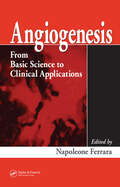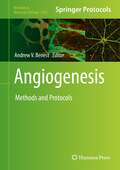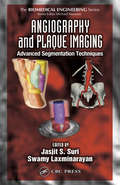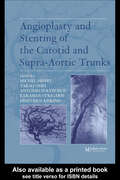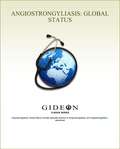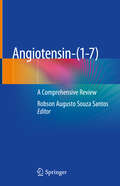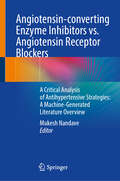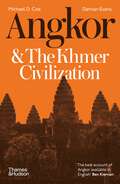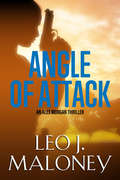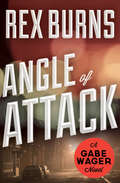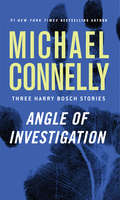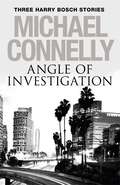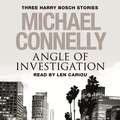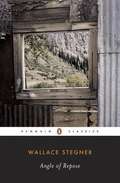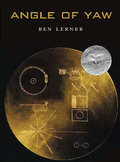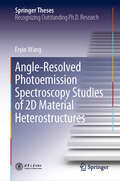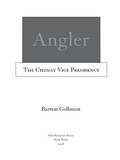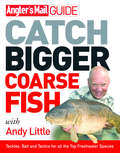- Table View
- List View
Angiogenesis: From Basic Science to Clinical Applications
by Napoleone FerraraWhy a new book on angiogenesis and why now? For the first time concepts proposed over 30 years ago have found clinical validation. In the last two years the first antiangiogenic agents have been approved by the FDA for the treatment of cancer and age-related macular degeneration. Not surprisingly, this clinical success has raised a new set of basic
Angiogenesis: Methods and Protocols (Methods in Molecular Biology #2441)
by Andrew V. BenestThis detailed book builds on the foundation of lymphatic protocols with tools to aid in the interpretation of large datasets created by angiogenesis research. For example, this includes protocols to explore how transcriptional phenotyping can be achieved, both in terms of exploring tissue-specific heterogeneity to the use of database mining of existing datasets. Similarly, bioinformatic techniques run alongside protocols for transcript analysis, cell biology, pathology, as well as physiological and developmental angiogenesis models. Written for the highly successful Methods in Molecular Biology series, chapters include introductions to their respective topics, lists of the necessary materials and reagents, step-by-step, readily reproducible laboratory protocols, and tips on troubleshooting and avoiding known pitfalls. Authoritative and up-to-date, Angiogenesis: Methods and Protocols provides a meaningful compendium of practical approaches to angiogenesis and endothelial cell biology research.
Angiography and Plaque Imaging: Advanced Segmentation Techniques (Biomedical Engineering Ser.)
by Jasjit S. Suri Swamy LaxminarayanRecent, rapid advances in mathematical engineering and applied mathematics have opened the door to solving complex problems in angiography imaging. For the first time, this book presents the different medical imaging modalities--MR, CT, x-ray, and ultrasound--for performing angiography and its analysis. Pioneers from a variety of relevant disciplin
Angioplasty and Stenting of Carotid and Supra-aortic Trunks
by Michel Henry Dimitrios Kiskinis Takao Ohki Kyriakos Strigaris Antonio Polydorou Chief PatronAlthough carotid endarectomy (CEA) has long been considered the gold standard technique, recent studies report that short- and long-term results with carotid angioplasty and stenting(CAS) are comparable to those with CEA in a significant number of cases. Covering clinical assessment, techniques and devices, medical treatment, and more, Angioplasty
Angiostrongyliasis: Global Status 2010 edition
by Dr Stephen Berger Gideon InformaticsAngiostrongyliasis: Global Status is one in a series of GIDEON ebooks which summarize the status of individual infectious diseases, in every country of the world. Data are based on the GIDEON database (www.gideononline.com) which relies on standard text books, peer-review journals, Health Ministry reports and ProMED, supplemented by an ongoing search of the medical literature. Chapters are arranged alphabetically, by country name. Each section is divided into five subsections. 1. Descriptive epidemiology 2. Summary of clinical features 3. Global status of the disease 4. Status of the disease in a specific country 5. References Angiostrongyliasis: Global Status includes separate sections on Angiostrongyliasis, and Angiostrongyliasis - abdominal.
Angiotensin Protocols (Methods in Molecular Medicine #51)
by Donna H. WangDonna Wang and a panel of hands-on experts describe in step-by-step detail all the major molecular, biochemical, and functional techniques now used in probing the renin-angiotensin system. These range from the use of embryonic gene targeting to create of mutant strains, to the functional investigation of components of the renin-angiotensin system. Comprehensive and highly practical, Angiotensin Protocols translates expert knowledge into readily reproducible methods that enable all biomedical investigators successfully to explore the role of angiotensin in health and disease today.
Angiotensin-(1-7): A Comprehensive Review
by Robson Augusto Souza SantosThis is the first book addressing in full the most important aspects of the angiotensin-(1-7), the key peptide of the protective axis and the main component in the new modulatory concept of the renin-angiotensin system. It features a detailed review of angiotensin-(1-7) and its receptor Mas, comprising the historical background, enzymatic pathways for generation, functions, integrative aspects of its protective profile, and its therapeutic potential. It also encompasses a comprehensive presentation of current knowledge about its widespread biological actions on several tissues, as well as the most recent scientific achievements, emerging from preclinical and clinical trials. Dr. Santos is a renowned researcher on the Renin-Angiontensin system, with remarkable achievements regarding the role of peptides such as alamandine and angiontensin-(1-7). He has also worked on the potential clinical applicability of angiotensin-(1-7)-related drugs for cardiovascular diseases. He has an extensive publication record in the field, including the publication of the book The Protective Arm of the Renin Angiotensin System (Academic Press, 2015).Angiotensin-(1-7) will make a unique contribution to the literature and will be an important resource for biomedical students and researchers, medical practitioners and any other professional interested in this peptide and its role in the renin-angiotensin system.
Angiotensin-converting Enzyme Inhibitors vs. Angiotensin Receptor Blockers: A Critical Analysis of Antihypertensive Strategies: A Machine-Generated Literature Overview
by Mukesh NandaveThis book delves into the various aspects of the renin-angiotensin-aldosterone system (RAAS) and its role in cardiovascular disorders. It explores the use of anti-hypertensive agents, with a focus on (ACE) angiotensin-converting enzyme inhibitors and angiotensin receptor blockers (ARBs). The chapters cover topics such as the preferred use of ACE inhibitors over ARBs in high-risk patients, the impact of these agents on insulin resistance, their role in acute heart failure and peripheral artery disease, and their immunomodulatory activity in hypertensive patients. Additionally, the book examines the role of ACE inhibitors and ARBs in COVID-19 patients and provides insights into recent trends in managing hypertension through RAAS inhibition. It serves as a valuable resource for researchers, clinicians, and healthcare professionals involved in the field of cardiovascular medicine.
Angkor and the Khmer Civilization (Second)
by Michael D. Coe Damian EvansAn authoritative survey of Angkor and the Khmer civilization which incorporates revelations from new discoveries in the past decade that are rewriting history. The ancient city of Angkor in Cambodia has fascinated scholars and visitors alike since its rediscovery in the mid-nineteenth century. All are wonderstruck by the beauty and multiplicity of the sculptures that adorn its temples and structures and are overwhelmed by the sheer size of Angkor. There is nothing to equal it in the archaeological world. A great deal was already known about the history of Angkor and the brilliant Khmer civilization that built it thanks to pioneering work by archaeologists and scholars, but our knowledge has now been completely revolutionized by cutting-edge technology. Airborne laser scanning (LiDAR) has revealed entire cities that were previously unknown and a complex urban landscape with highways and waterways, profoundly transforming our interpretations of the development and supposed decline of Angkor. In this comprehensive edition of Angkor and the Khmer Civilization, respected archaeologist Michael Coe is joined by Damian Evans, who led this remarkable program of scientific exploration, to present the results and implications of these groundbreaking discoveries that are rewriting history.
Angle Resolved Photoemission Spectroscopy of Delafossite Metals (Springer Theses)
by Veronika SunkoThis thesis describes the results of angle resolved photoemission spectroscopy experiments on delafossite oxide metals, and theoretical work explaining these observations. The study was motivated by the extraordinarily high conductivity of the non-magnetic delafossites PdCoO2 and PtCoO2, the measurement of whose electronic structure is reported and discussed. Two unexpected effects were observed in the course of the investigation; each is described and analysed in detail. Firstly, a previously unrecognised type of spectroscopic signal, allowing the non-magnetic probe of photoemission to become sensitive to spin-spin correlations, was observed in the antiferromagnetic PdCrO2. Its origin was identified as the Kondo-like coupling of itinerant and Mott insulating electrons. Furthermore, surface states exhibiting an unusually large Rashba-like spin-splitting were observed on the transition metal terminated surfaces of delafossites. The large inversion symmetry breaking energy scale, a consequence of the unusual structure of the surface layer, is identified as the origin of the effect.
Angle of Attack (An Alex Morgan Thriller #1)
by Leo J. MaloneyReal-life Black Ops veteran Leo J. Maloney launches an electrifying new series featuring Alex Morgan, daughter of legendary operative Dan Morgan and a formidable force in her own right.ANGLE OF ATTACK Alex Morgan&’s new mission for Zeta plunges her into a web of danger threatening Europe&’s glamorous Formula One racing circuit. It quickly escalates into a race against time to track down a missing supply of weapons-grade plutonium headed for North America. From a secret prison in Iran to the glittering casinos of Monaco, to the jungles of Malaysia, and to the dark side of Montreal, Alex is up against a deadly and far-reaching conspiracy. Each step of the way, she&’s dogged by a shadowy figure determined to destroy her. Alex has the grit to deal with any external threat, but this is a new kind of peril from a source shockingly close to home—one that will make Alex question everything she once believed... Praise for Leo J. Maloney and His Novels &”Fine writing and real insider knowledge.&” —Lee Child &“Rings with authenticity.&” —John Gilstrap &“Everything a thriller reader wants.&” —Ben Coes &“The new master of the modern spy game.&” —Mark Sullivan &“A ripping story!&” —Meg Gardiner
Angle of Attack (The Gabe Wager Novels #4)
by Rex BurnsA tip about a murdered mob boss forces Gabe Wager to reopen a cold caseA year ago, Marco Scorvelli was murdered while picking up his morning paper. A sawed-off shotgun put a hole in his stomach, and streaked the inside of his sports coat with the mob boss&’s innards. As Scorvelli crawled towards his front door, the killer left the shotgun angled neatly on the sidewalk. No prints were recovered, and no headway was ever made on the case. Now a reliable underworld source passes a message to homicide detective Gabe Wager. The killing wasn&’t ordered by a rival family, but by Scorvelli&’s brother, in an attempt to take control of the organization. After a year of peace, a war is about to erupt between Denver&’s Italian and Hispanic crime syndicates, and Gabe Wager will be in the middle, trying to keep the city from burning to the ground.
Angle of Attack (The Gabe Wager Novels #4)
by Rex BurnsA tip about a murdered mob boss forces Gabe Wager to reopen a cold caseA year ago, Marco Scorvelli was murdered while picking up his morning paper. A sawed-off shotgun put a hole in his stomach, and streaked the inside of his sports coat with the mob boss&’s innards. As Scorvelli crawled towards his front door, the killer left the shotgun angled neatly on the sidewalk. No prints were recovered, and no headway was ever made on the case. Now a reliable underworld source passes a message to homicide detective Gabe Wager. The killing wasn&’t ordered by a rival family, but by Scorvelli&’s brother, in an attempt to take control of the organization. After a year of peace, a war is about to erupt between Denver&’s Italian and Hispanic crime syndicates, and Gabe Wager will be in the middle, trying to keep the city from burning to the ground.
Angle of Investigation (3 Harry Bosch Stories): Three Harry Bosch Stories
by Michael ConnellyLAPD Detective Harry Bosch tackles three tough cases that span a legendary career in this never-before-collected trio of stories.In "Christmas Even," the case of a burglar killed in mid-heist leads Bosch to retrace a link to his past. In "Father's Day," Bosch investigates a young boy's seemingly accidental death and confronts his own fears as a father. In "Angle of Investigation," Bosch delves into one of the first homicides he ever worked back as a uniformed rookie patrolman, a case that was left unsolved for decades.Together, these gripping stories span Bosch's controversial career at the LAPD, and show the evolution of the haunted, legendary investigator he would become. Utterly unputdownable, they are proof that "Connelly never stops doling out the suspense....Once it grabs you in those first few pages, it won't let go of you" (Boston Globe).
Angle of Investigation: Three Harry Bosch Short Stories
by Michael ConnellyLAPD Detective Harry Bosch tackles a trio of tough cases in an exclusive eBook containing three compelling short stories.In CHRISTMAS EVEN, the case of a burglar killed in mid-heist leads Bosch to retrace a link to his past. In FATHER'S DAY, Bosch investigates a young boy's seemingly accidental death and confronts his own fears as a father. In ANGLE OF INVESTIGATION, Bosch delves into one of the first homicides he ever worked back as a uniformed rookie patrolman, a case that was left unsolved for decades.Together, these gripping stories span Bosch's controversial career at the LAPD and show the evolution of the haunted, legendary investigator he would become. Utterly unputdownable, they are proof that 'Connelly is a crime writing genius' INDEPENDENT ON SUNDAY.
Angle of Investigation: Three Harry Bosch Short Stories (Harry Bosch)
by Michael ConnellyIn CHRISTMAS EVEN, the case of a burglar killed in mid-heist leads Bosch to retrace a link to his past. In FATHER'S DAY, Bosch investigates a young boy's seemingly accidental death and confronts his own fears as a father. In ANGLE OF INVESTIGATION, Bosch delves into one of the first homicides he ever worked back as a uniformed rookie patrolman, a case that was left unsolved for decades.Together, these gripping stories span Bosch's controversial career at the LAPD and show the evolution of the haunted, legendary investigator he would become. Utterly unputdownable, they are proof that 'Connelly is a crime writing genius' INDEPENDENT ON SUNDAY.Read by Len Cariou(p) 2011 Hachette Audio
Angle of Repose (Modern Classics Ser.)
by Wallace Stegner Jackson J. BensonStegner’s Pulitzer Prize-winning novel of personal, historical, and geographic discovery Confined to a wheelchair, retired historian Lyman Ward sets out to write his grandparents' remarkable story, chronicling their days spent carving civilization into the surface of America's western frontier. But his research reveals even more about his own life than he's willing to admit. What emerges is an enthralling portrait of four generations in the life of an American family. "Cause for celebration . . . A superb novel with an amplitude of scale and richness of detail altogether uncommon in contemporary fiction." —The Atlantic Monthly"Brilliant . . . Two stories, past and present, merge to produce what important fiction must: a sense of the enchantment of life." —Los Angeles Times This Penguin Classics edition features an introduction by Jackson J. Benson.For more than sixty-five years, Penguin has been the leading publisher of classic literature in the English-speaking world. With more than 1,500 titles, Penguin Classics represents a global bookshelf of the best works throughout history and across genres and disciplines. Readers trust the series to provide authoritative texts enhanced by introductions and notes by distinguished scholars and contemporary authors, as well as up-to-date translations by award-winning translators.
Angle of Yaw
by Ben LernerIn his bold second book, Ben Lerner molds philosophical insight, political outrage, and personal experience into a devastating critique of mass society. Angle of Yaw investigates the fate of public space, public speech, and how the technologies of viewing-aerial photography in particular-feed our culture an image of itself. And it's a spectacular view.The man observes the action on the field with the tiny television he brought to the stadium. He is topless, painted gold, bewigged. His exaggerated foam index finger indicates the giant screen upon which his own image is now displayed, a model of fanaticism. He watches the image of his watching the image on his portable TV on his portable TV. He suddenly stands with arms upraised and initiates the wave that will consume him.Haunted by our current "war on terror," much of the book was written while Lerner was living in Madrid (at the time of the Atocha bombings and their political aftermath), as the author steeped himself in the history of Franco and fascism. Regardless of when or where it was written, Angle of Yaw will further establish Ben Lerner as one of our most intriguing and least predictable poets.
Angle-Resolved Photoemission Spectroscopy Studies of 2D Material Heterostructures (Springer Theses)
by Eryin WangThis book focuses on angle-resolved photoemission spectroscopy studies on novel interfacial phenomena in three typical two-dimensional material heterostructures: graphene/h-BN, twisted bilayer graphene, and topological insulator/high-temperature superconductors. Since the discovery of graphene, two-dimensional materials have proven to be quite a large “family”. As an alternative to searching for other family members with distinct properties, the combination of two-dimensional (2D) materials to construct heterostructures offers a new platform for achieving new quantum phenomena, exploring new physics, and designing new quantum devices. By stacking different 2D materials together and utilizing interfacial periodical potential and order-parameter coupling, the resulting heterostructure’s electronic properties can be tuned to achieve novel properties distinct from those of its constituent materials. This book offers a valuable reference guide for all researchers and students working in the area of condensed matter physics and materials science.
Angle-Resolved Photoemission Spectroscopy Study of Spin Fluctuations in the Cuprate Superconductors (Springer Theses)
by Francisco RestrepoThis thesis makes significant advances towards an understanding of superconductivity in the cuprate family of unconventional, high-temperature superconductors. Even though the high-temperature superconductors were discovered over 35 years ago, there is not yet a general consensus on an acceptable theory of superconductivity in these materials. One of the early proposals suggested that collective magnetic excitations of the conduction electrons could lead them to form pairs, which in turn condense to form the superconducting state at a critical temperature Tc. Quantitative calculations of Tc using experimental data were, however, not available to verify the applicability of this magnetic mechanism. In this thesis, the author constructed an angle-resolved photoemission apparatus that could provide sufficiently accurate data of the electronic excitation spectra of samples in the normal state, data which was furthermore unusually devoid of any surface contamination. The author also applied the Bethe-Salpeter method to his uncommonly pristine and precise normal state data, and was able to predict the approximate superconducting transition temperatures of different samples. This rare combination of experiment with sophisticated theoretical calculations leads to the conclusion that antiferromagnetic correlations are a viable candidate for the pairing interaction in the cuprate superconductors.
Angle-Resolved Photoemission Spectroscopy on High-Temperature Superconductors: Studies of Bi2212 and Single-Layer FeSe Film Grown on SrTiO3 Substrate (Springer Theses)
by Junfeng HeThis book mainly focuses on the study of the high-temperature superconductor Bi2Sr2CaCu2O8+δ (Bi2212) and single-layer FeSe film grown on SrTiO3 (STO) substrate by means of angle-resolved photoemission spectroscopy (ARPES). It provides the first electronic evidence for the origin of the anomalous high-temperature superconductivity in single-layer FeSe grown on SrTiO3 substrate. Two coexisted sharp-mode couplings have been identified in superconducting Bi2212. The first ARPES study on single-layer FeSe/STO films has provided key insights into the electronic origin of superconductivity in this system. A phase diagram and electronic indication of high Tc and insulator to superconductor crossover have been established in the single-layer FeSe/STO films. Readers will find essential information on the techniques used and interesting physical phenomena observed by ARPES.
Angle-Resolved Photoemission Study of Kagome Superconductors AV3Sb5 (Springer Theses)
by Takemi KatoThis book presents high-resolution angle-resolved photoemission spectroscopy (ARPES) experiments on kagome superconductors KV3Sb5, RbV3Sb5, and CsV3Sb5—an ideal material family for studying rich physical phenomena originating from the geometric structure of kagome lattice—with the aim of elucidating the electronic structure and the origin of charge density wave (CDW) and superconductivity. The book begins with an introduction to kagome superconductors, followed by a description of ARPES which is the main tool used in the presented work in this book. The part of the experimental results consists of three chapters: The first chapter describes observation of low-energy excitations, Fermi-surface and momentum-dependent CDW gap by high-resolution ARPES on CsV3Sb5 and KV3Sb5; the second chapter shows evolution of electronic states upon alkali-metal dosing and isovalent substitution, and discusses their relation to modulation of physical properties; the other chapter provides the result of micro-ARPES on KV3Sb5, RbV3Sb5, and CsV3Sb5, and demonstrates the surface-termination- and alkali-metal-dependent three dimensional CDW character.
Angler
by Barton GellmanThe landmark exposé of the most powerful and secretive vice president in American history Barton Gellman shared the Pulitzer Prize in 2008 for a keen-edged reckoning with Dick Cheney?s domestic agenda in The Washington Post. In Angler, Gellman goes far beyond that series to take on the full scope of Cheney?s work and its consequences, including his hidden role in the Bush administration?s most fateful choices in war: shifting focus from al Qaeda to Iraq, unleashing the National Security Agency to spy at home, and promoting ?cruel and inhumane? methods of interrogation. Packed with fresh insights and untold stories, Gellman parts the curtains of secrecy to show how the vice president operated and what he wrought.
Angler's Guide to Fishes of the Gulf of Mexico
by Mike Lane Jerald HorstA fisherman&’s illustrated reference guide to 207 saltwater species. This book is a treasure trove of pictures and information for recreational and commercial fishermen, or anyone who loves the outdoors. Since most anglers identify their fish by reviewing illustrations rather than using scientific keys, the authors have made fishing easier by providing superb illustrations and detailed diagnostics for fish identification. A valuable, one-stop reference tool for everyday anglers, fisheries experts, biologists, and outdoors writers, this guide includes intensively researched information on 207 species of saltwater fish, essential data on each species&’ habitat, identification, typical size, and food value.
Angler's Mail Guide: Catch Bigger Coarse Fish
by Andy Little Roy WestwoodAndy Little, the top all-rounder in UK coarse fishing, shares the secrets of his success catching major freshwater species in this eagerly awaited guide. It is the most authoritative big fish book published for many years and rates as essential reading for anglers of all ages and levels of ability. Every coarse angler will gain valuable insights into the tackle, baits and techniques needed to achieve personal bests from their local waters. There has never been a better time to hunt big fish in British waters as many species have ballooned in size in rivers and lakes accessible to all. This guide cuts through the complexities of the sport to provide positive short cuts to success. It offers detailed coverage of all major coarse species including roach, bream, pike, tench, crucians, barbel, chub, rudd, perch and dace, and carp. Illustrated with striking colour photographs from Anglers' Mail photographer Roy Westwood, this is the most up-to-date manual of its kind for one of the country's most popular sports and adds up to the best ever companion for any ambitious angler.
